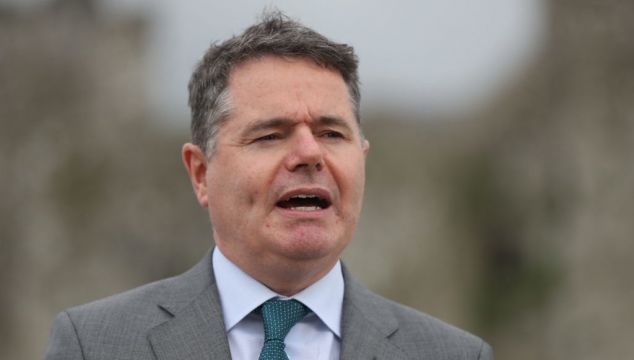Ireland's Gross Domestic Product (GDP) - the total value of goods and services produced in the country - increased by 10.8 per cent in the first three months of 2022, according to the latest figures from the Central Statistics Office (CSO).
Minister for Finance Paschal Donohoe said the growth was "exceptionally strong", however, he added: "Part of this is no-doubt a 'washing out' of some of the one-off factors that led to the unusual negative quarter at the end of last year."
"It is important also to put these volatile figures into context. GDP is not an accurate measure of what is going on in the domestic economy, given the size of the multinational sector," the Minister said.
The CSO figures also showed Ireland's Gross National Product (GNP) contracted by 0.4 per cent during the first quarter of this year, while Modified Domestic Demand - a broad measure of underlying domestic activity across personal, government and investment spending - also fell by 1 per cent.
Illustrating Mr Donohoe's point, multinational dominated sectors grew by 14.1 per cent during the same period. The increase noted in sectors focused on the domestic was just over half that figure, rising by 7.6 per cent.
Overall, the State's Balance of Payments recorded a surplus of €17.4 billion in transactions with from around the world between January-March this year.
Mixed bag
Personal consumption was down 0.7 per cent after Q1, which may be due to households attempting to manage their spending due to the rising cost of living.
Imports and construction were also down, 12.3 per cent and 3.7 per cent respectively on the previous three-month period, while investments saw a 39.5 per cent reduction compared to the final three months of 2021.
On the other hand, the distribution, transport, hotels and restaurants sectors noted a combined increase of 11.9 per cent on 2021 Q4 figures, while the financial and insurance activities sector and industry (excluding construction) sector also saw improvements early this year.
"Today’s release comes at a time of unprecedented geopolitical instability and uncertainty," Mr Donohoe said.

"The war and the subsequent waves of economic and financial sanctions represents a large ‘supply-side’ shock to the global economy.
"As a result, inflationary pressures have risen sharply, with the annual rate of inflation in May estimated at a multi-decade high of 8.2 per cent on the back of sharp increases in energy prices."
However, the Minister added: "The strength of our labour market and continued improvements in the public finances confirm that we approach the current challenges from a position of strength.
"In calibrating how we respond to the current challenges, it is important that we strike the right balance and ensure policy doesn’t inadvertently add further inflationary pressures into the system."







